Strategic Development: HR Portfolio for Junior Line Manager Interview
VerifiedAdded on 2023/04/25
|23
|6466
|65
Portfolio
AI Summary
This assignment presents a self-development portfolio designed for a junior line manager position in HR, focusing on training and development within a chosen organization. The portfolio includes a personal skills audit, SWOT analysis, a detailed personal development plan, a reflective statement, and insights on lifelong learning. Furthermore, it incorporates an information document that analyzes factors crucial for implementing and evaluating inclusive learning and training processes. The document also covers continuous professional development, employee engagement, performance management, and organizational culture, culminating in a management report that highlights the importance of these elements in achieving high-performance outcomes within the organization.
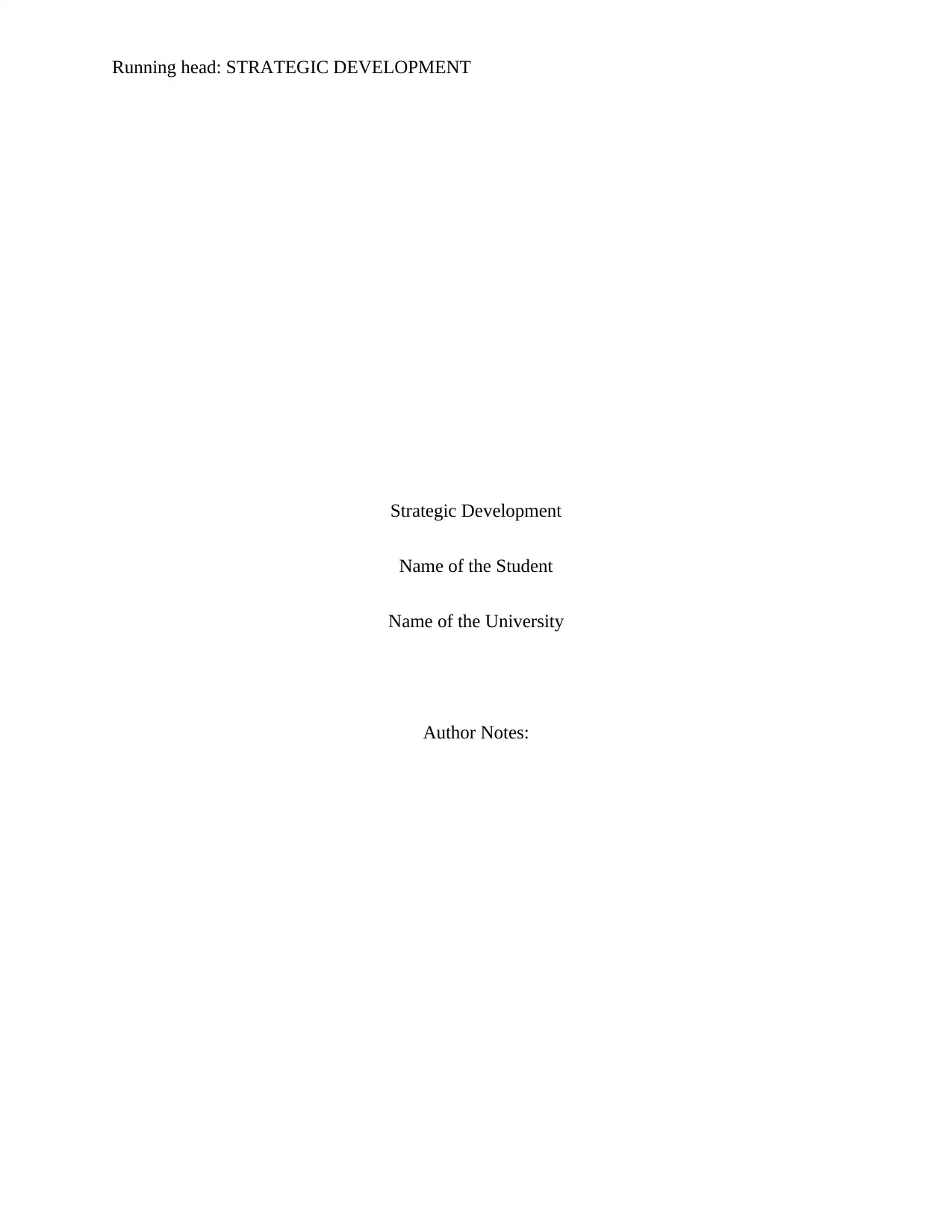
Running head: STRATEGIC DEVELOPMENT
Strategic Development
Name of the Student
Name of the University
Author Notes:
Strategic Development
Name of the Student
Name of the University
Author Notes:
Paraphrase This Document
Need a fresh take? Get an instant paraphrase of this document with our AI Paraphraser
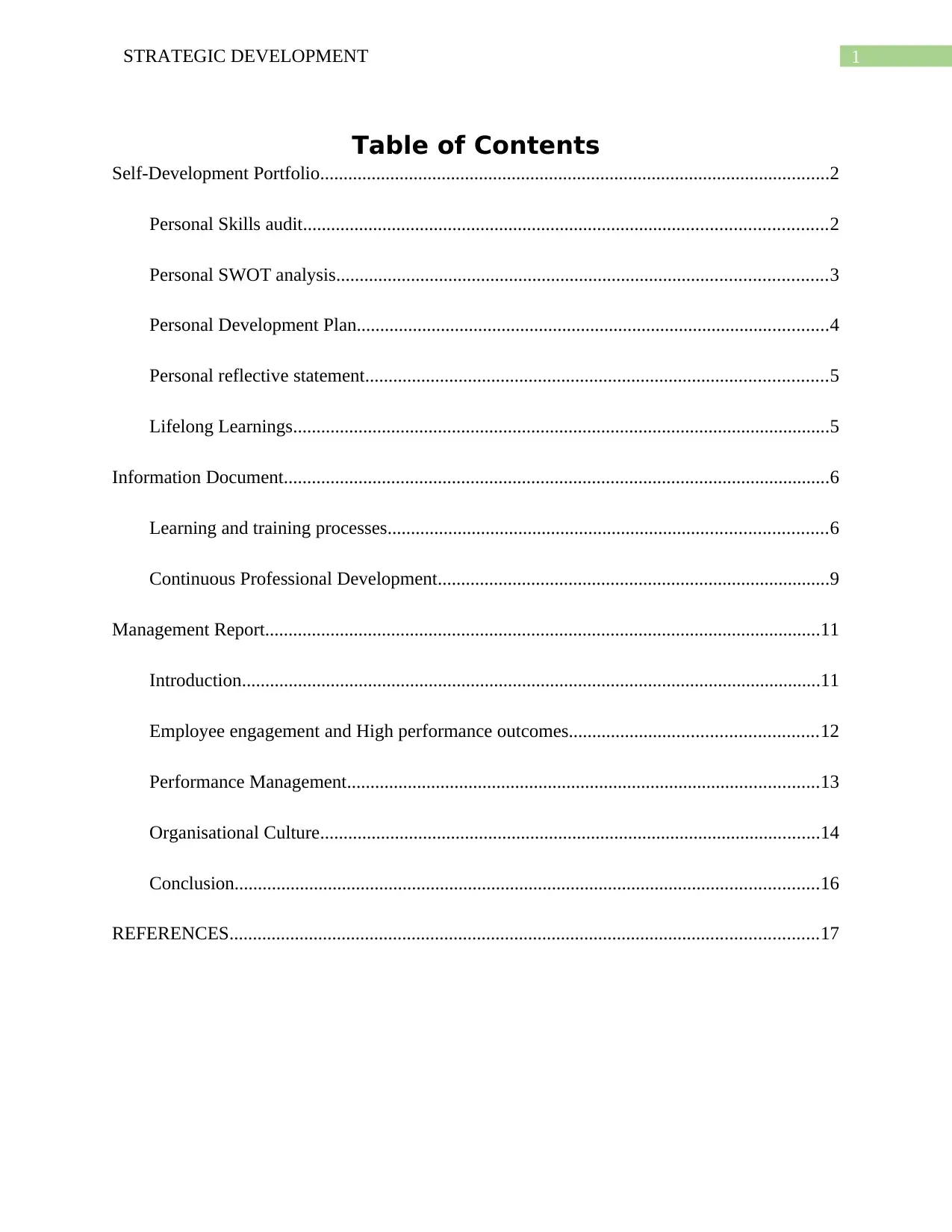
1STRATEGIC DEVELOPMENT
Table of Contents
Self-Development Portfolio.............................................................................................................2
Personal Skills audit................................................................................................................2
Personal SWOT analysis.........................................................................................................3
Personal Development Plan.....................................................................................................4
Personal reflective statement...................................................................................................5
Lifelong Learnings...................................................................................................................5
Information Document.....................................................................................................................6
Learning and training processes..............................................................................................6
Continuous Professional Development....................................................................................9
Management Report.......................................................................................................................11
Introduction............................................................................................................................11
Employee engagement and High performance outcomes.....................................................12
Performance Management.....................................................................................................13
Organisational Culture...........................................................................................................14
Conclusion.............................................................................................................................16
REFERENCES..............................................................................................................................17
Table of Contents
Self-Development Portfolio.............................................................................................................2
Personal Skills audit................................................................................................................2
Personal SWOT analysis.........................................................................................................3
Personal Development Plan.....................................................................................................4
Personal reflective statement...................................................................................................5
Lifelong Learnings...................................................................................................................5
Information Document.....................................................................................................................6
Learning and training processes..............................................................................................6
Continuous Professional Development....................................................................................9
Management Report.......................................................................................................................11
Introduction............................................................................................................................11
Employee engagement and High performance outcomes.....................................................12
Performance Management.....................................................................................................13
Organisational Culture...........................................................................................................14
Conclusion.............................................................................................................................16
REFERENCES..............................................................................................................................17
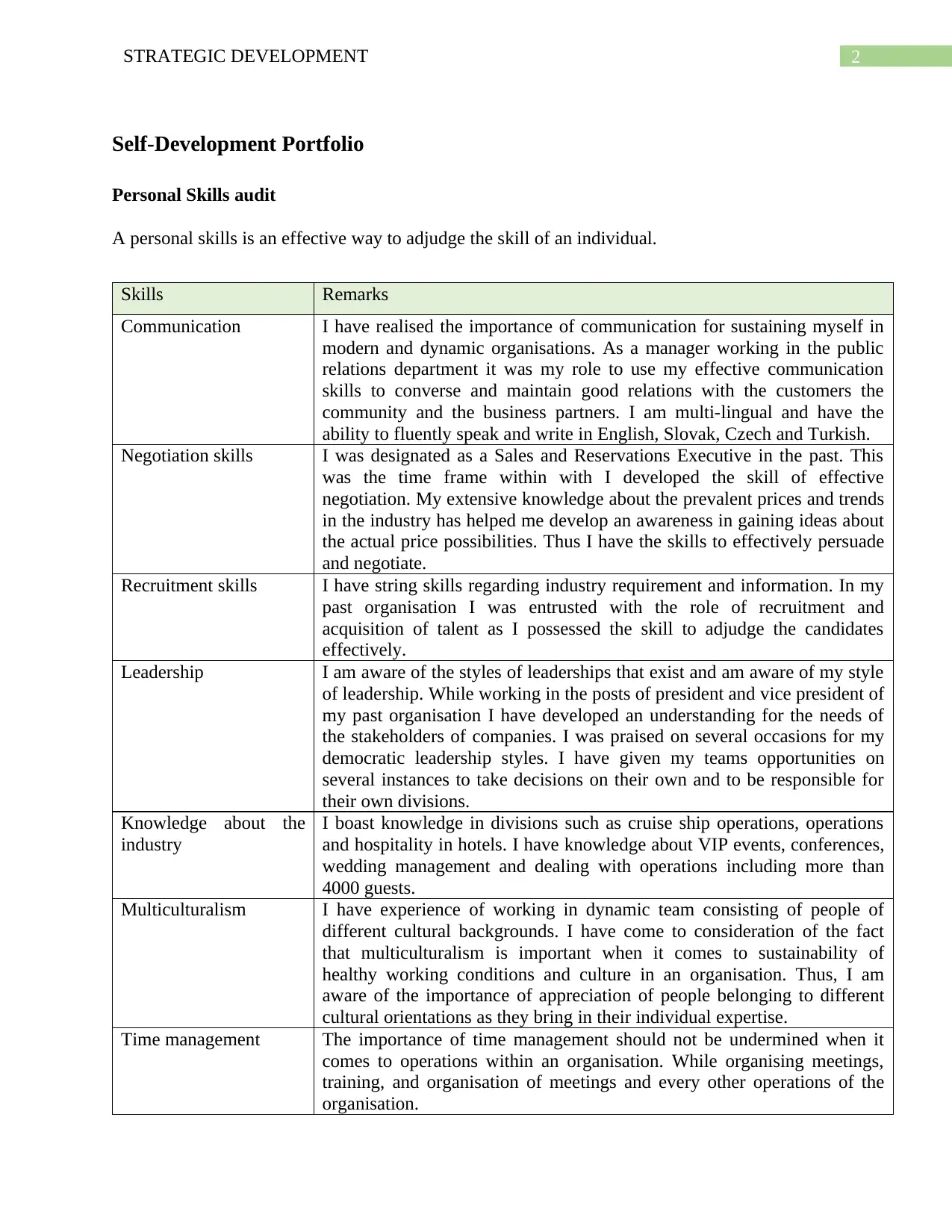
2STRATEGIC DEVELOPMENT
Self-Development Portfolio
Personal Skills audit
A personal skills is an effective way to adjudge the skill of an individual.
Skills Remarks
Communication I have realised the importance of communication for sustaining myself in
modern and dynamic organisations. As a manager working in the public
relations department it was my role to use my effective communication
skills to converse and maintain good relations with the customers the
community and the business partners. I am multi-lingual and have the
ability to fluently speak and write in English, Slovak, Czech and Turkish.
Negotiation skills I was designated as a Sales and Reservations Executive in the past. This
was the time frame within with I developed the skill of effective
negotiation. My extensive knowledge about the prevalent prices and trends
in the industry has helped me develop an awareness in gaining ideas about
the actual price possibilities. Thus I have the skills to effectively persuade
and negotiate.
Recruitment skills I have string skills regarding industry requirement and information. In my
past organisation I was entrusted with the role of recruitment and
acquisition of talent as I possessed the skill to adjudge the candidates
effectively.
Leadership I am aware of the styles of leaderships that exist and am aware of my style
of leadership. While working in the posts of president and vice president of
my past organisation I have developed an understanding for the needs of
the stakeholders of companies. I was praised on several occasions for my
democratic leadership styles. I have given my teams opportunities on
several instances to take decisions on their own and to be responsible for
their own divisions.
Knowledge about the
industry
I boast knowledge in divisions such as cruise ship operations, operations
and hospitality in hotels. I have knowledge about VIP events, conferences,
wedding management and dealing with operations including more than
4000 guests.
Multiculturalism I have experience of working in dynamic team consisting of people of
different cultural backgrounds. I have come to consideration of the fact
that multiculturalism is important when it comes to sustainability of
healthy working conditions and culture in an organisation. Thus, I am
aware of the importance of appreciation of people belonging to different
cultural orientations as they bring in their individual expertise.
Time management The importance of time management should not be undermined when it
comes to operations within an organisation. While organising meetings,
training, and organisation of meetings and every other operations of the
organisation.
Self-Development Portfolio
Personal Skills audit
A personal skills is an effective way to adjudge the skill of an individual.
Skills Remarks
Communication I have realised the importance of communication for sustaining myself in
modern and dynamic organisations. As a manager working in the public
relations department it was my role to use my effective communication
skills to converse and maintain good relations with the customers the
community and the business partners. I am multi-lingual and have the
ability to fluently speak and write in English, Slovak, Czech and Turkish.
Negotiation skills I was designated as a Sales and Reservations Executive in the past. This
was the time frame within with I developed the skill of effective
negotiation. My extensive knowledge about the prevalent prices and trends
in the industry has helped me develop an awareness in gaining ideas about
the actual price possibilities. Thus I have the skills to effectively persuade
and negotiate.
Recruitment skills I have string skills regarding industry requirement and information. In my
past organisation I was entrusted with the role of recruitment and
acquisition of talent as I possessed the skill to adjudge the candidates
effectively.
Leadership I am aware of the styles of leaderships that exist and am aware of my style
of leadership. While working in the posts of president and vice president of
my past organisation I have developed an understanding for the needs of
the stakeholders of companies. I was praised on several occasions for my
democratic leadership styles. I have given my teams opportunities on
several instances to take decisions on their own and to be responsible for
their own divisions.
Knowledge about the
industry
I boast knowledge in divisions such as cruise ship operations, operations
and hospitality in hotels. I have knowledge about VIP events, conferences,
wedding management and dealing with operations including more than
4000 guests.
Multiculturalism I have experience of working in dynamic team consisting of people of
different cultural backgrounds. I have come to consideration of the fact
that multiculturalism is important when it comes to sustainability of
healthy working conditions and culture in an organisation. Thus, I am
aware of the importance of appreciation of people belonging to different
cultural orientations as they bring in their individual expertise.
Time management The importance of time management should not be undermined when it
comes to operations within an organisation. While organising meetings,
training, and organisation of meetings and every other operations of the
organisation.
⊘ This is a preview!⊘
Do you want full access?
Subscribe today to unlock all pages.

Trusted by 1+ million students worldwide
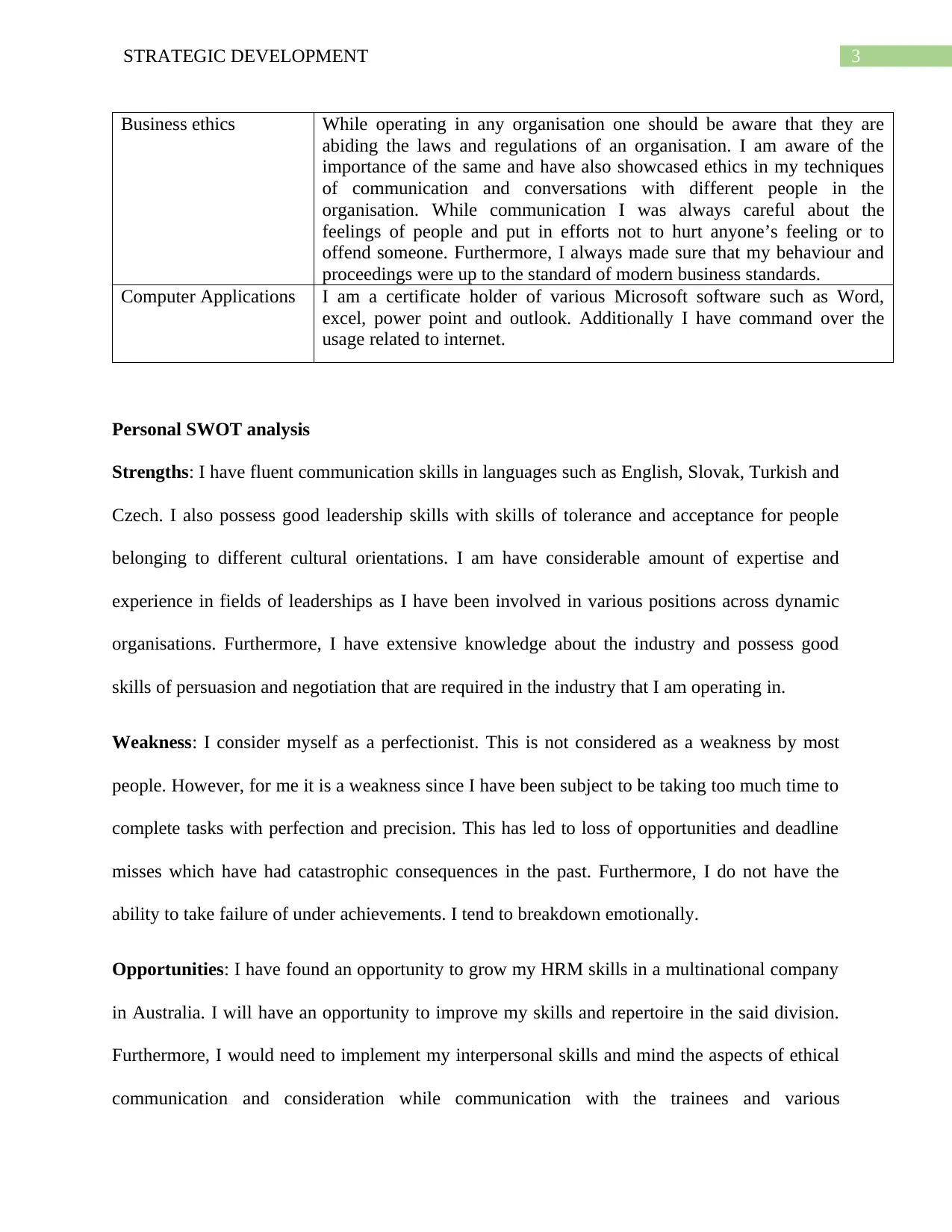
3STRATEGIC DEVELOPMENT
Business ethics While operating in any organisation one should be aware that they are
abiding the laws and regulations of an organisation. I am aware of the
importance of the same and have also showcased ethics in my techniques
of communication and conversations with different people in the
organisation. While communication I was always careful about the
feelings of people and put in efforts not to hurt anyone’s feeling or to
offend someone. Furthermore, I always made sure that my behaviour and
proceedings were up to the standard of modern business standards.
Computer Applications I am a certificate holder of various Microsoft software such as Word,
excel, power point and outlook. Additionally I have command over the
usage related to internet.
Personal SWOT analysis
Strengths: I have fluent communication skills in languages such as English, Slovak, Turkish and
Czech. I also possess good leadership skills with skills of tolerance and acceptance for people
belonging to different cultural orientations. I am have considerable amount of expertise and
experience in fields of leaderships as I have been involved in various positions across dynamic
organisations. Furthermore, I have extensive knowledge about the industry and possess good
skills of persuasion and negotiation that are required in the industry that I am operating in.
Weakness: I consider myself as a perfectionist. This is not considered as a weakness by most
people. However, for me it is a weakness since I have been subject to be taking too much time to
complete tasks with perfection and precision. This has led to loss of opportunities and deadline
misses which have had catastrophic consequences in the past. Furthermore, I do not have the
ability to take failure of under achievements. I tend to breakdown emotionally.
Opportunities: I have found an opportunity to grow my HRM skills in a multinational company
in Australia. I will have an opportunity to improve my skills and repertoire in the said division.
Furthermore, I would need to implement my interpersonal skills and mind the aspects of ethical
communication and consideration while communication with the trainees and various
Business ethics While operating in any organisation one should be aware that they are
abiding the laws and regulations of an organisation. I am aware of the
importance of the same and have also showcased ethics in my techniques
of communication and conversations with different people in the
organisation. While communication I was always careful about the
feelings of people and put in efforts not to hurt anyone’s feeling or to
offend someone. Furthermore, I always made sure that my behaviour and
proceedings were up to the standard of modern business standards.
Computer Applications I am a certificate holder of various Microsoft software such as Word,
excel, power point and outlook. Additionally I have command over the
usage related to internet.
Personal SWOT analysis
Strengths: I have fluent communication skills in languages such as English, Slovak, Turkish and
Czech. I also possess good leadership skills with skills of tolerance and acceptance for people
belonging to different cultural orientations. I am have considerable amount of expertise and
experience in fields of leaderships as I have been involved in various positions across dynamic
organisations. Furthermore, I have extensive knowledge about the industry and possess good
skills of persuasion and negotiation that are required in the industry that I am operating in.
Weakness: I consider myself as a perfectionist. This is not considered as a weakness by most
people. However, for me it is a weakness since I have been subject to be taking too much time to
complete tasks with perfection and precision. This has led to loss of opportunities and deadline
misses which have had catastrophic consequences in the past. Furthermore, I do not have the
ability to take failure of under achievements. I tend to breakdown emotionally.
Opportunities: I have found an opportunity to grow my HRM skills in a multinational company
in Australia. I will have an opportunity to improve my skills and repertoire in the said division.
Furthermore, I would need to implement my interpersonal skills and mind the aspects of ethical
communication and consideration while communication with the trainees and various
Paraphrase This Document
Need a fresh take? Get an instant paraphrase of this document with our AI Paraphraser
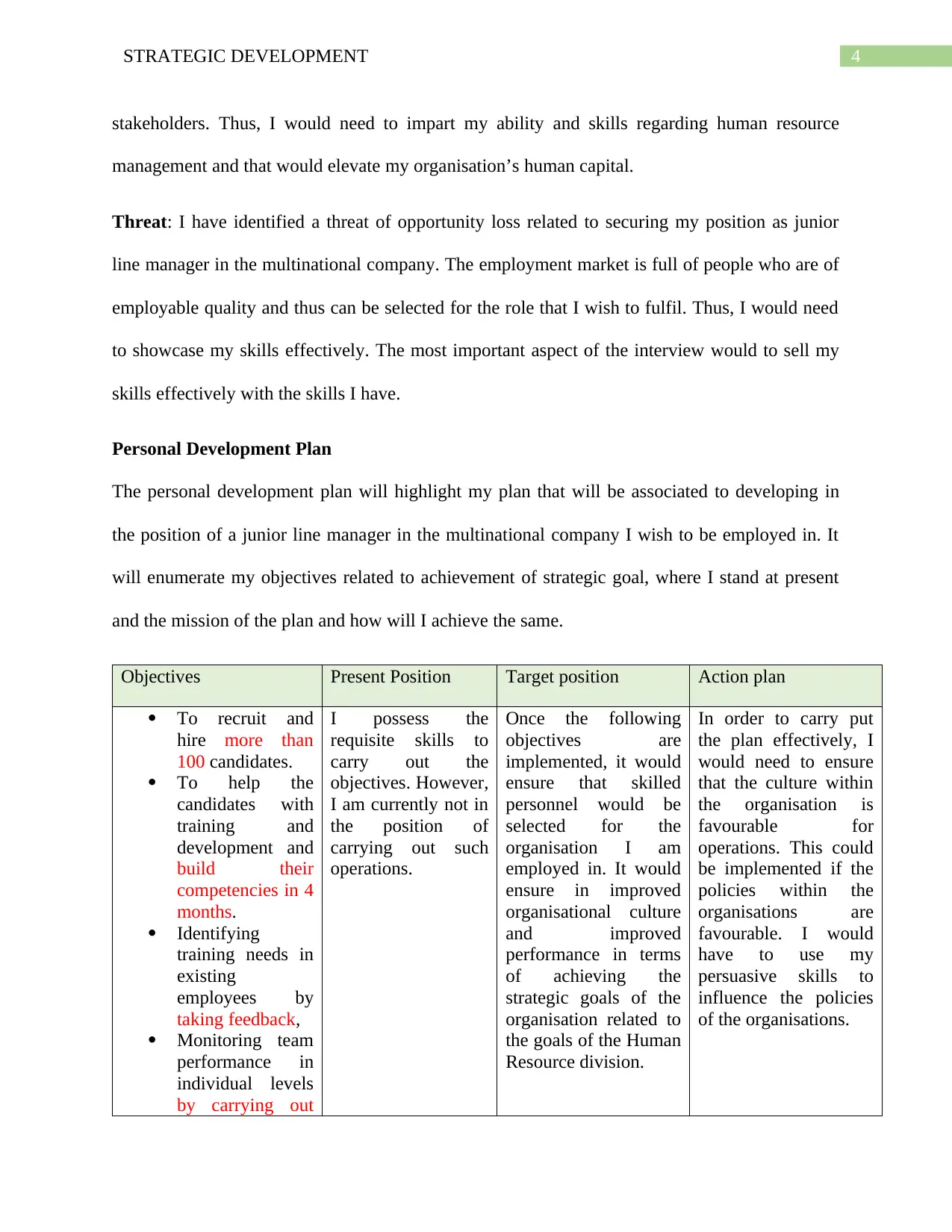
4STRATEGIC DEVELOPMENT
stakeholders. Thus, I would need to impart my ability and skills regarding human resource
management and that would elevate my organisation’s human capital.
Threat: I have identified a threat of opportunity loss related to securing my position as junior
line manager in the multinational company. The employment market is full of people who are of
employable quality and thus can be selected for the role that I wish to fulfil. Thus, I would need
to showcase my skills effectively. The most important aspect of the interview would to sell my
skills effectively with the skills I have.
Personal Development Plan
The personal development plan will highlight my plan that will be associated to developing in
the position of a junior line manager in the multinational company I wish to be employed in. It
will enumerate my objectives related to achievement of strategic goal, where I stand at present
and the mission of the plan and how will I achieve the same.
Objectives Present Position Target position Action plan
To recruit and
hire more than
100 candidates.
To help the
candidates with
training and
development and
build their
competencies in 4
months.
Identifying
training needs in
existing
employees by
taking feedback,
Monitoring team
performance in
individual levels
by carrying out
I possess the
requisite skills to
carry out the
objectives. However,
I am currently not in
the position of
carrying out such
operations.
Once the following
objectives are
implemented, it would
ensure that skilled
personnel would be
selected for the
organisation I am
employed in. It would
ensure in improved
organisational culture
and improved
performance in terms
of achieving the
strategic goals of the
organisation related to
the goals of the Human
Resource division.
In order to carry put
the plan effectively, I
would need to ensure
that the culture within
the organisation is
favourable for
operations. This could
be implemented if the
policies within the
organisations are
favourable. I would
have to use my
persuasive skills to
influence the policies
of the organisations.
stakeholders. Thus, I would need to impart my ability and skills regarding human resource
management and that would elevate my organisation’s human capital.
Threat: I have identified a threat of opportunity loss related to securing my position as junior
line manager in the multinational company. The employment market is full of people who are of
employable quality and thus can be selected for the role that I wish to fulfil. Thus, I would need
to showcase my skills effectively. The most important aspect of the interview would to sell my
skills effectively with the skills I have.
Personal Development Plan
The personal development plan will highlight my plan that will be associated to developing in
the position of a junior line manager in the multinational company I wish to be employed in. It
will enumerate my objectives related to achievement of strategic goal, where I stand at present
and the mission of the plan and how will I achieve the same.
Objectives Present Position Target position Action plan
To recruit and
hire more than
100 candidates.
To help the
candidates with
training and
development and
build their
competencies in 4
months.
Identifying
training needs in
existing
employees by
taking feedback,
Monitoring team
performance in
individual levels
by carrying out
I possess the
requisite skills to
carry out the
objectives. However,
I am currently not in
the position of
carrying out such
operations.
Once the following
objectives are
implemented, it would
ensure that skilled
personnel would be
selected for the
organisation I am
employed in. It would
ensure in improved
organisational culture
and improved
performance in terms
of achieving the
strategic goals of the
organisation related to
the goals of the Human
Resource division.
In order to carry put
the plan effectively, I
would need to ensure
that the culture within
the organisation is
favourable for
operations. This could
be implemented if the
policies within the
organisations are
favourable. I would
have to use my
persuasive skills to
influence the policies
of the organisations.
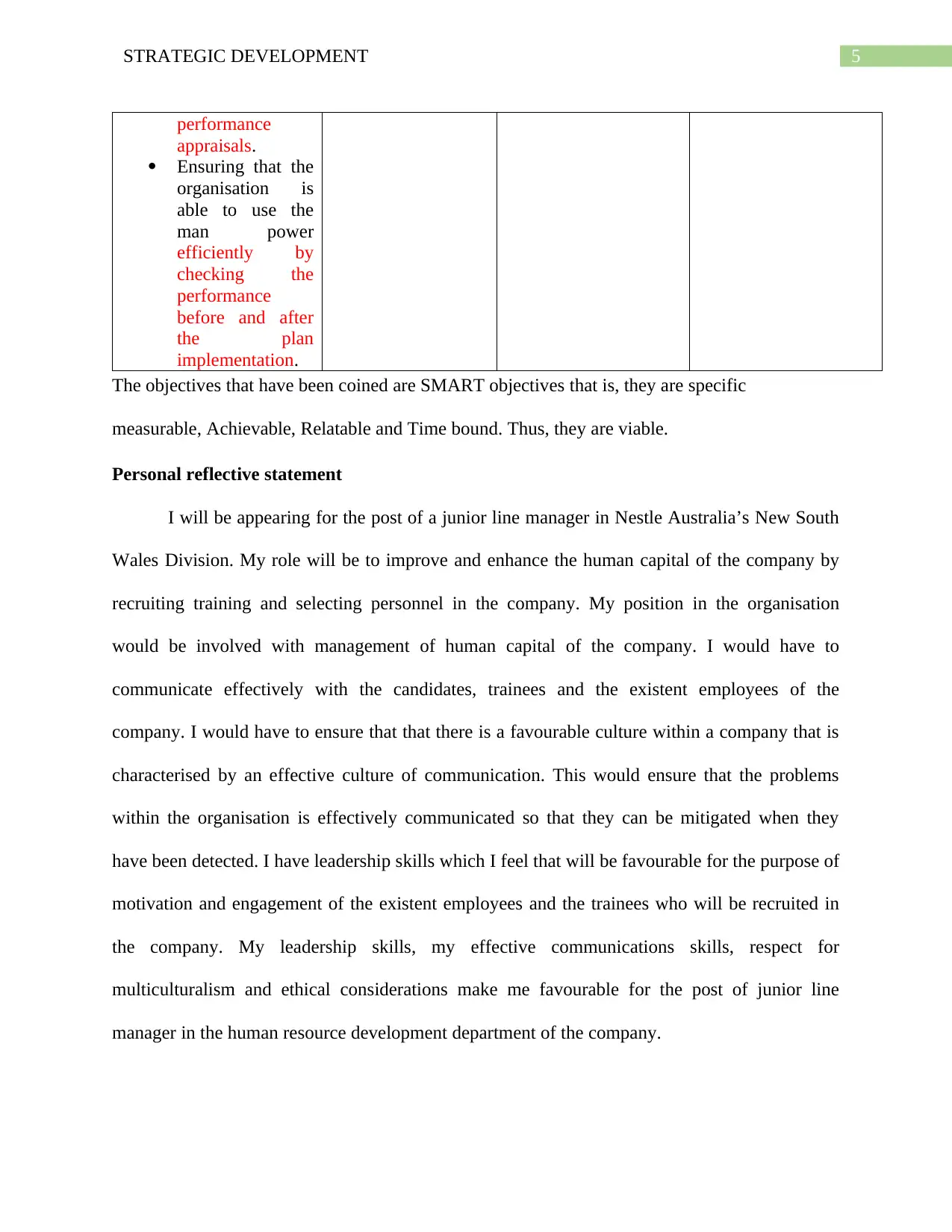
5STRATEGIC DEVELOPMENT
performance
appraisals.
Ensuring that the
organisation is
able to use the
man power
efficiently by
checking the
performance
before and after
the plan
implementation.
The objectives that have been coined are SMART objectives that is, they are specific
measurable, Achievable, Relatable and Time bound. Thus, they are viable.
Personal reflective statement
I will be appearing for the post of a junior line manager in Nestle Australia’s New South
Wales Division. My role will be to improve and enhance the human capital of the company by
recruiting training and selecting personnel in the company. My position in the organisation
would be involved with management of human capital of the company. I would have to
communicate effectively with the candidates, trainees and the existent employees of the
company. I would have to ensure that that there is a favourable culture within a company that is
characterised by an effective culture of communication. This would ensure that the problems
within the organisation is effectively communicated so that they can be mitigated when they
have been detected. I have leadership skills which I feel that will be favourable for the purpose of
motivation and engagement of the existent employees and the trainees who will be recruited in
the company. My leadership skills, my effective communications skills, respect for
multiculturalism and ethical considerations make me favourable for the post of junior line
manager in the human resource development department of the company.
performance
appraisals.
Ensuring that the
organisation is
able to use the
man power
efficiently by
checking the
performance
before and after
the plan
implementation.
The objectives that have been coined are SMART objectives that is, they are specific
measurable, Achievable, Relatable and Time bound. Thus, they are viable.
Personal reflective statement
I will be appearing for the post of a junior line manager in Nestle Australia’s New South
Wales Division. My role will be to improve and enhance the human capital of the company by
recruiting training and selecting personnel in the company. My position in the organisation
would be involved with management of human capital of the company. I would have to
communicate effectively with the candidates, trainees and the existent employees of the
company. I would have to ensure that that there is a favourable culture within a company that is
characterised by an effective culture of communication. This would ensure that the problems
within the organisation is effectively communicated so that they can be mitigated when they
have been detected. I have leadership skills which I feel that will be favourable for the purpose of
motivation and engagement of the existent employees and the trainees who will be recruited in
the company. My leadership skills, my effective communications skills, respect for
multiculturalism and ethical considerations make me favourable for the post of junior line
manager in the human resource development department of the company.
⊘ This is a preview!⊘
Do you want full access?
Subscribe today to unlock all pages.

Trusted by 1+ million students worldwide
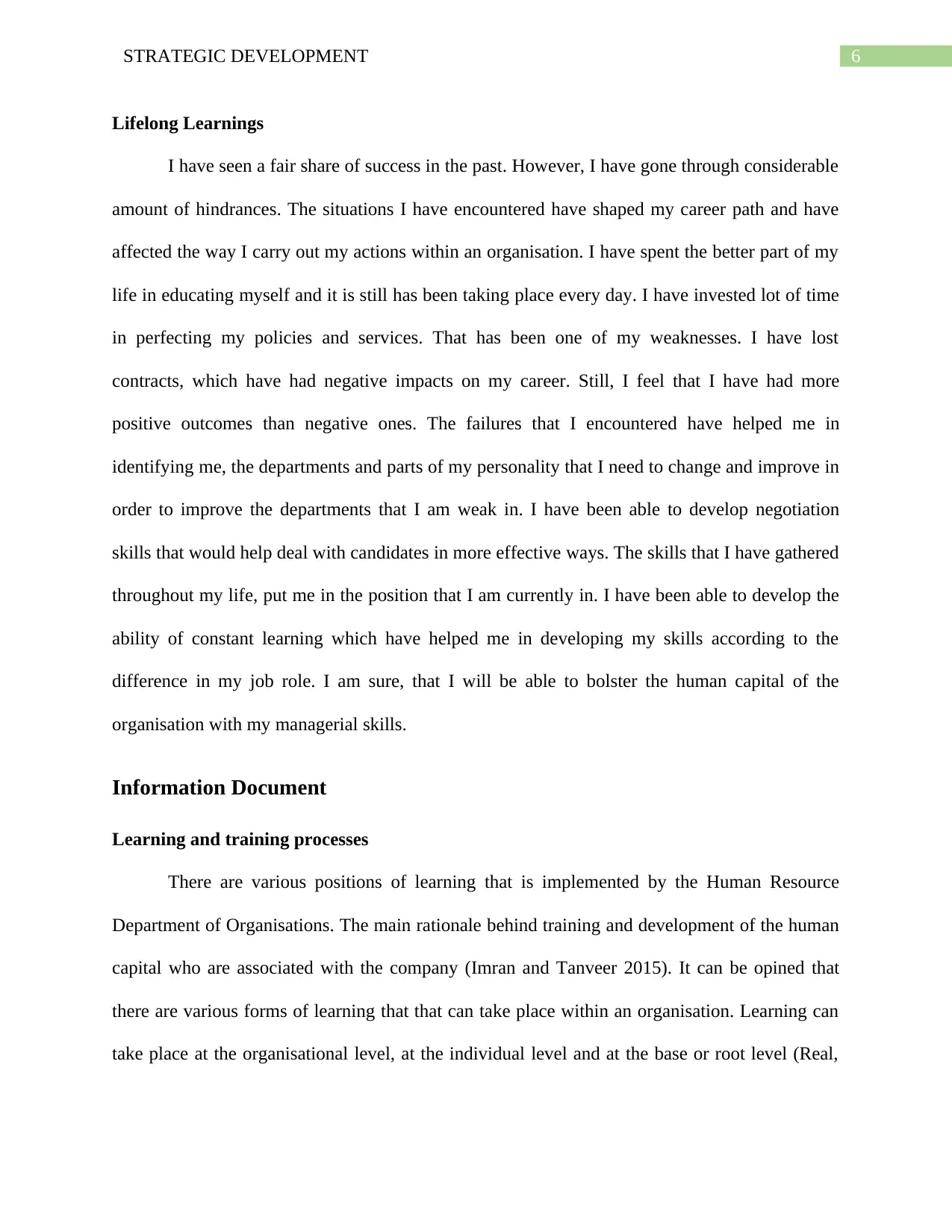
6STRATEGIC DEVELOPMENT
Lifelong Learnings
I have seen a fair share of success in the past. However, I have gone through considerable
amount of hindrances. The situations I have encountered have shaped my career path and have
affected the way I carry out my actions within an organisation. I have spent the better part of my
life in educating myself and it is still has been taking place every day. I have invested lot of time
in perfecting my policies and services. That has been one of my weaknesses. I have lost
contracts, which have had negative impacts on my career. Still, I feel that I have had more
positive outcomes than negative ones. The failures that I encountered have helped me in
identifying me, the departments and parts of my personality that I need to change and improve in
order to improve the departments that I am weak in. I have been able to develop negotiation
skills that would help deal with candidates in more effective ways. The skills that I have gathered
throughout my life, put me in the position that I am currently in. I have been able to develop the
ability of constant learning which have helped me in developing my skills according to the
difference in my job role. I am sure, that I will be able to bolster the human capital of the
organisation with my managerial skills.
Information Document
Learning and training processes
There are various positions of learning that is implemented by the Human Resource
Department of Organisations. The main rationale behind training and development of the human
capital who are associated with the company (Imran and Tanveer 2015). It can be opined that
there are various forms of learning that that can take place within an organisation. Learning can
take place at the organisational level, at the individual level and at the base or root level (Real,
Lifelong Learnings
I have seen a fair share of success in the past. However, I have gone through considerable
amount of hindrances. The situations I have encountered have shaped my career path and have
affected the way I carry out my actions within an organisation. I have spent the better part of my
life in educating myself and it is still has been taking place every day. I have invested lot of time
in perfecting my policies and services. That has been one of my weaknesses. I have lost
contracts, which have had negative impacts on my career. Still, I feel that I have had more
positive outcomes than negative ones. The failures that I encountered have helped me in
identifying me, the departments and parts of my personality that I need to change and improve in
order to improve the departments that I am weak in. I have been able to develop negotiation
skills that would help deal with candidates in more effective ways. The skills that I have gathered
throughout my life, put me in the position that I am currently in. I have been able to develop the
ability of constant learning which have helped me in developing my skills according to the
difference in my job role. I am sure, that I will be able to bolster the human capital of the
organisation with my managerial skills.
Information Document
Learning and training processes
There are various positions of learning that is implemented by the Human Resource
Department of Organisations. The main rationale behind training and development of the human
capital who are associated with the company (Imran and Tanveer 2015). It can be opined that
there are various forms of learning that that can take place within an organisation. Learning can
take place at the organisational level, at the individual level and at the base or root level (Real,
Paraphrase This Document
Need a fresh take? Get an instant paraphrase of this document with our AI Paraphraser
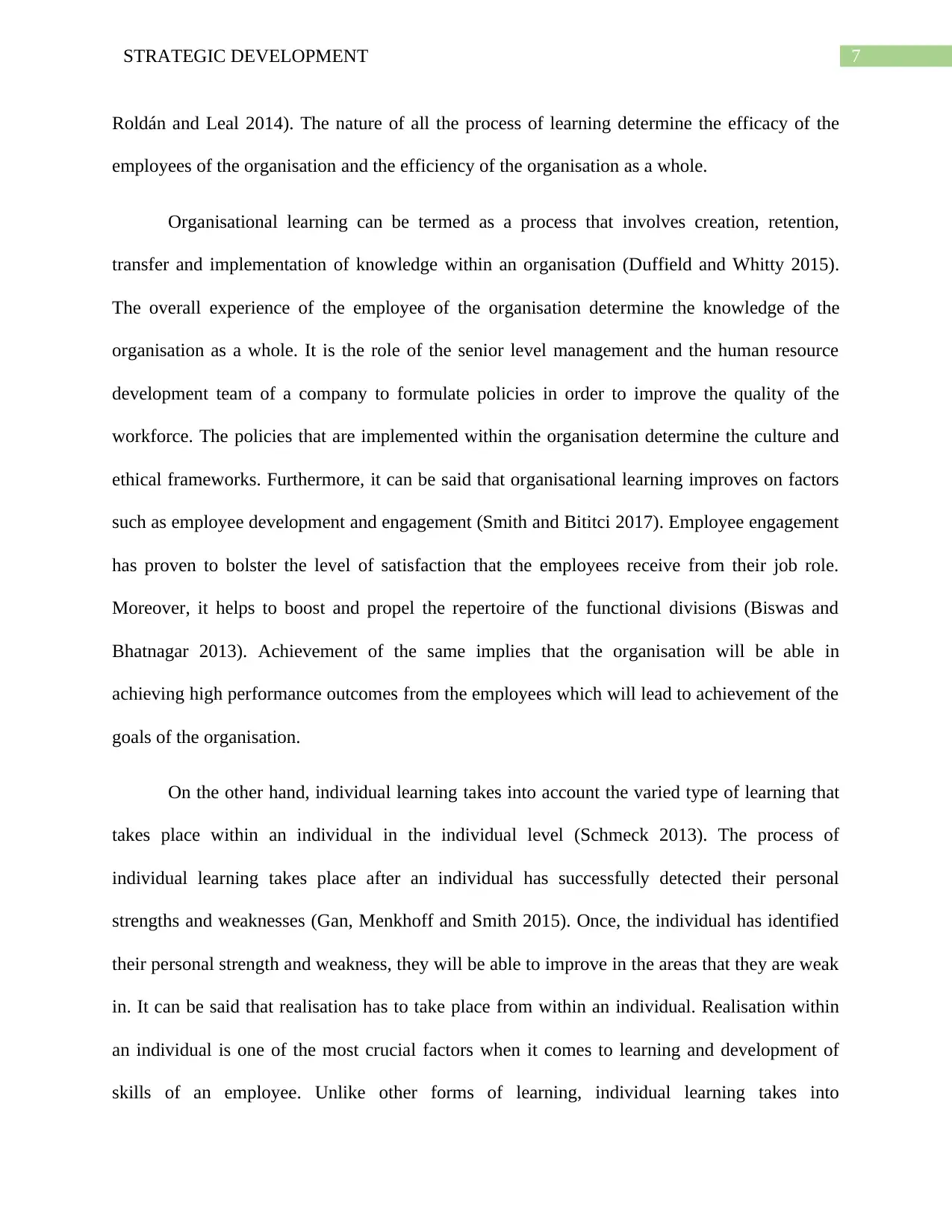
7STRATEGIC DEVELOPMENT
Roldán and Leal 2014). The nature of all the process of learning determine the efficacy of the
employees of the organisation and the efficiency of the organisation as a whole.
Organisational learning can be termed as a process that involves creation, retention,
transfer and implementation of knowledge within an organisation (Duffield and Whitty 2015).
The overall experience of the employee of the organisation determine the knowledge of the
organisation as a whole. It is the role of the senior level management and the human resource
development team of a company to formulate policies in order to improve the quality of the
workforce. The policies that are implemented within the organisation determine the culture and
ethical frameworks. Furthermore, it can be said that organisational learning improves on factors
such as employee development and engagement (Smith and Bititci 2017). Employee engagement
has proven to bolster the level of satisfaction that the employees receive from their job role.
Moreover, it helps to boost and propel the repertoire of the functional divisions (Biswas and
Bhatnagar 2013). Achievement of the same implies that the organisation will be able in
achieving high performance outcomes from the employees which will lead to achievement of the
goals of the organisation.
On the other hand, individual learning takes into account the varied type of learning that
takes place within an individual in the individual level (Schmeck 2013). The process of
individual learning takes place after an individual has successfully detected their personal
strengths and weaknesses (Gan, Menkhoff and Smith 2015). Once, the individual has identified
their personal strength and weakness, they will be able to improve in the areas that they are weak
in. It can be said that realisation has to take place from within an individual. Realisation within
an individual is one of the most crucial factors when it comes to learning and development of
skills of an employee. Unlike other forms of learning, individual learning takes into
Roldán and Leal 2014). The nature of all the process of learning determine the efficacy of the
employees of the organisation and the efficiency of the organisation as a whole.
Organisational learning can be termed as a process that involves creation, retention,
transfer and implementation of knowledge within an organisation (Duffield and Whitty 2015).
The overall experience of the employee of the organisation determine the knowledge of the
organisation as a whole. It is the role of the senior level management and the human resource
development team of a company to formulate policies in order to improve the quality of the
workforce. The policies that are implemented within the organisation determine the culture and
ethical frameworks. Furthermore, it can be said that organisational learning improves on factors
such as employee development and engagement (Smith and Bititci 2017). Employee engagement
has proven to bolster the level of satisfaction that the employees receive from their job role.
Moreover, it helps to boost and propel the repertoire of the functional divisions (Biswas and
Bhatnagar 2013). Achievement of the same implies that the organisation will be able in
achieving high performance outcomes from the employees which will lead to achievement of the
goals of the organisation.
On the other hand, individual learning takes into account the varied type of learning that
takes place within an individual in the individual level (Schmeck 2013). The process of
individual learning takes place after an individual has successfully detected their personal
strengths and weaknesses (Gan, Menkhoff and Smith 2015). Once, the individual has identified
their personal strength and weakness, they will be able to improve in the areas that they are weak
in. It can be said that realisation has to take place from within an individual. Realisation within
an individual is one of the most crucial factors when it comes to learning and development of
skills of an employee. Unlike other forms of learning, individual learning takes into
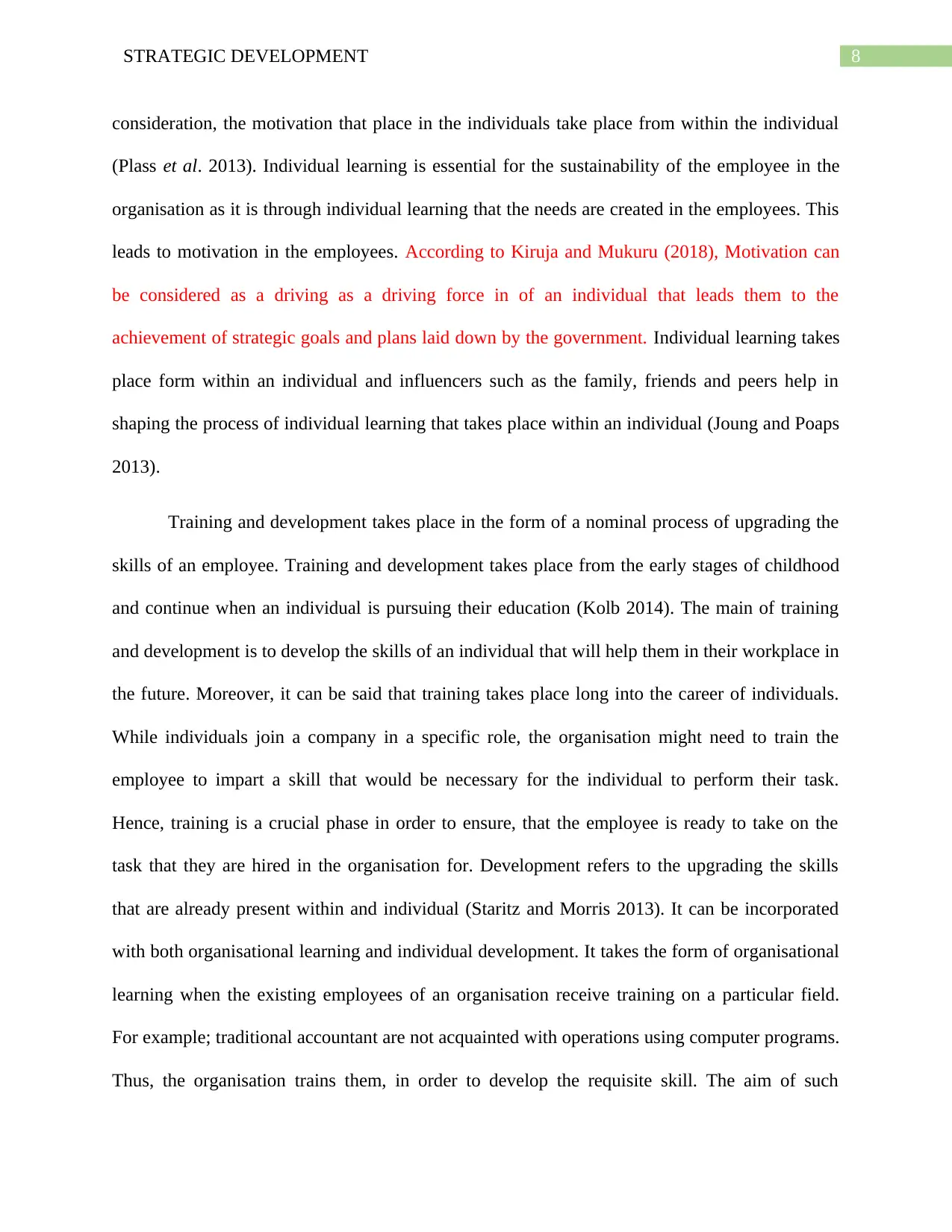
8STRATEGIC DEVELOPMENT
consideration, the motivation that place in the individuals take place from within the individual
(Plass et al. 2013). Individual learning is essential for the sustainability of the employee in the
organisation as it is through individual learning that the needs are created in the employees. This
leads to motivation in the employees. According to Kiruja and Mukuru (2018), Motivation can
be considered as a driving as a driving force in of an individual that leads them to the
achievement of strategic goals and plans laid down by the government. Individual learning takes
place form within an individual and influencers such as the family, friends and peers help in
shaping the process of individual learning that takes place within an individual (Joung and Poaps
2013).
Training and development takes place in the form of a nominal process of upgrading the
skills of an employee. Training and development takes place from the early stages of childhood
and continue when an individual is pursuing their education (Kolb 2014). The main of training
and development is to develop the skills of an individual that will help them in their workplace in
the future. Moreover, it can be said that training takes place long into the career of individuals.
While individuals join a company in a specific role, the organisation might need to train the
employee to impart a skill that would be necessary for the individual to perform their task.
Hence, training is a crucial phase in order to ensure, that the employee is ready to take on the
task that they are hired in the organisation for. Development refers to the upgrading the skills
that are already present within and individual (Staritz and Morris 2013). It can be incorporated
with both organisational learning and individual development. It takes the form of organisational
learning when the existing employees of an organisation receive training on a particular field.
For example; traditional accountant are not acquainted with operations using computer programs.
Thus, the organisation trains them, in order to develop the requisite skill. The aim of such
consideration, the motivation that place in the individuals take place from within the individual
(Plass et al. 2013). Individual learning is essential for the sustainability of the employee in the
organisation as it is through individual learning that the needs are created in the employees. This
leads to motivation in the employees. According to Kiruja and Mukuru (2018), Motivation can
be considered as a driving as a driving force in of an individual that leads them to the
achievement of strategic goals and plans laid down by the government. Individual learning takes
place form within an individual and influencers such as the family, friends and peers help in
shaping the process of individual learning that takes place within an individual (Joung and Poaps
2013).
Training and development takes place in the form of a nominal process of upgrading the
skills of an employee. Training and development takes place from the early stages of childhood
and continue when an individual is pursuing their education (Kolb 2014). The main of training
and development is to develop the skills of an individual that will help them in their workplace in
the future. Moreover, it can be said that training takes place long into the career of individuals.
While individuals join a company in a specific role, the organisation might need to train the
employee to impart a skill that would be necessary for the individual to perform their task.
Hence, training is a crucial phase in order to ensure, that the employee is ready to take on the
task that they are hired in the organisation for. Development refers to the upgrading the skills
that are already present within and individual (Staritz and Morris 2013). It can be incorporated
with both organisational learning and individual development. It takes the form of organisational
learning when the existing employees of an organisation receive training on a particular field.
For example; traditional accountant are not acquainted with operations using computer programs.
Thus, the organisation trains them, in order to develop the requisite skill. The aim of such
⊘ This is a preview!⊘
Do you want full access?
Subscribe today to unlock all pages.

Trusted by 1+ million students worldwide
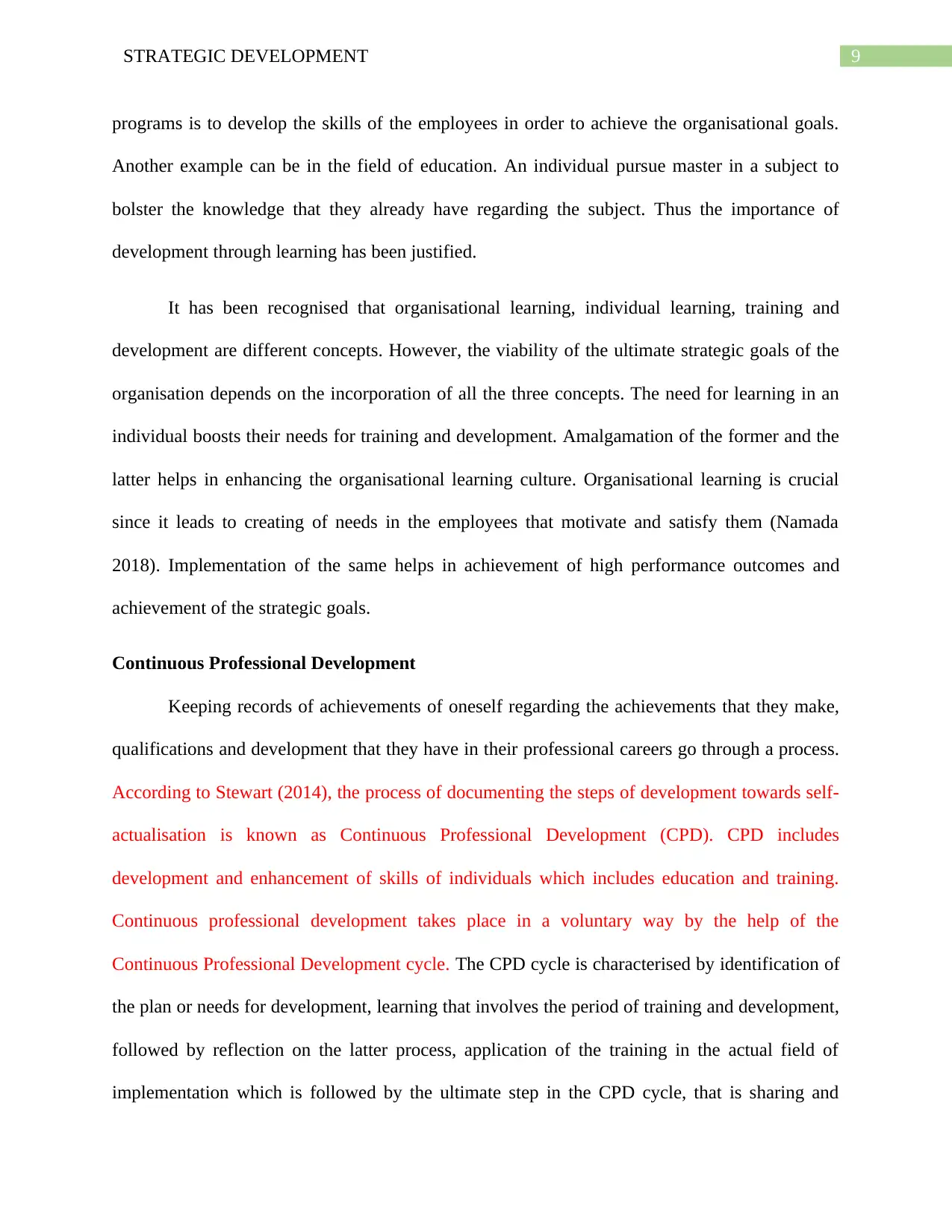
9STRATEGIC DEVELOPMENT
programs is to develop the skills of the employees in order to achieve the organisational goals.
Another example can be in the field of education. An individual pursue master in a subject to
bolster the knowledge that they already have regarding the subject. Thus the importance of
development through learning has been justified.
It has been recognised that organisational learning, individual learning, training and
development are different concepts. However, the viability of the ultimate strategic goals of the
organisation depends on the incorporation of all the three concepts. The need for learning in an
individual boosts their needs for training and development. Amalgamation of the former and the
latter helps in enhancing the organisational learning culture. Organisational learning is crucial
since it leads to creating of needs in the employees that motivate and satisfy them (Namada
2018). Implementation of the same helps in achievement of high performance outcomes and
achievement of the strategic goals.
Continuous Professional Development
Keeping records of achievements of oneself regarding the achievements that they make,
qualifications and development that they have in their professional careers go through a process.
According to Stewart (2014), the process of documenting the steps of development towards self-
actualisation is known as Continuous Professional Development (CPD). CPD includes
development and enhancement of skills of individuals which includes education and training.
Continuous professional development takes place in a voluntary way by the help of the
Continuous Professional Development cycle. The CPD cycle is characterised by identification of
the plan or needs for development, learning that involves the period of training and development,
followed by reflection on the latter process, application of the training in the actual field of
implementation which is followed by the ultimate step in the CPD cycle, that is sharing and
programs is to develop the skills of the employees in order to achieve the organisational goals.
Another example can be in the field of education. An individual pursue master in a subject to
bolster the knowledge that they already have regarding the subject. Thus the importance of
development through learning has been justified.
It has been recognised that organisational learning, individual learning, training and
development are different concepts. However, the viability of the ultimate strategic goals of the
organisation depends on the incorporation of all the three concepts. The need for learning in an
individual boosts their needs for training and development. Amalgamation of the former and the
latter helps in enhancing the organisational learning culture. Organisational learning is crucial
since it leads to creating of needs in the employees that motivate and satisfy them (Namada
2018). Implementation of the same helps in achievement of high performance outcomes and
achievement of the strategic goals.
Continuous Professional Development
Keeping records of achievements of oneself regarding the achievements that they make,
qualifications and development that they have in their professional careers go through a process.
According to Stewart (2014), the process of documenting the steps of development towards self-
actualisation is known as Continuous Professional Development (CPD). CPD includes
development and enhancement of skills of individuals which includes education and training.
Continuous professional development takes place in a voluntary way by the help of the
Continuous Professional Development cycle. The CPD cycle is characterised by identification of
the plan or needs for development, learning that involves the period of training and development,
followed by reflection on the latter process, application of the training in the actual field of
implementation which is followed by the ultimate step in the CPD cycle, that is sharing and
Paraphrase This Document
Need a fresh take? Get an instant paraphrase of this document with our AI Paraphraser
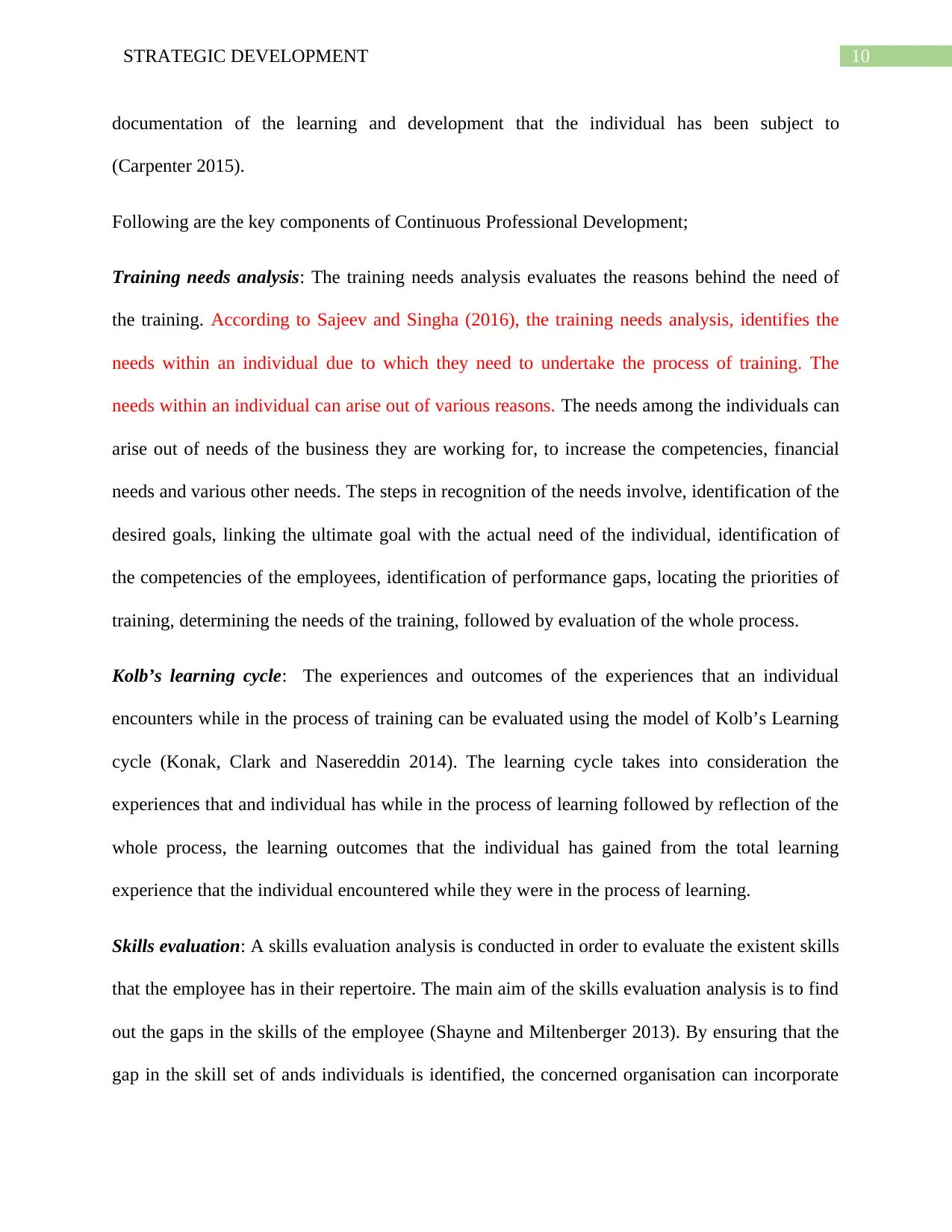
10STRATEGIC DEVELOPMENT
documentation of the learning and development that the individual has been subject to
(Carpenter 2015).
Following are the key components of Continuous Professional Development;
Training needs analysis: The training needs analysis evaluates the reasons behind the need of
the training. According to Sajeev and Singha (2016), the training needs analysis, identifies the
needs within an individual due to which they need to undertake the process of training. The
needs within an individual can arise out of various reasons. The needs among the individuals can
arise out of needs of the business they are working for, to increase the competencies, financial
needs and various other needs. The steps in recognition of the needs involve, identification of the
desired goals, linking the ultimate goal with the actual need of the individual, identification of
the competencies of the employees, identification of performance gaps, locating the priorities of
training, determining the needs of the training, followed by evaluation of the whole process.
Kolb’s learning cycle: The experiences and outcomes of the experiences that an individual
encounters while in the process of training can be evaluated using the model of Kolb’s Learning
cycle (Konak, Clark and Nasereddin 2014). The learning cycle takes into consideration the
experiences that and individual has while in the process of learning followed by reflection of the
whole process, the learning outcomes that the individual has gained from the total learning
experience that the individual encountered while they were in the process of learning.
Skills evaluation: A skills evaluation analysis is conducted in order to evaluate the existent skills
that the employee has in their repertoire. The main aim of the skills evaluation analysis is to find
out the gaps in the skills of the employee (Shayne and Miltenberger 2013). By ensuring that the
gap in the skill set of ands individuals is identified, the concerned organisation can incorporate
documentation of the learning and development that the individual has been subject to
(Carpenter 2015).
Following are the key components of Continuous Professional Development;
Training needs analysis: The training needs analysis evaluates the reasons behind the need of
the training. According to Sajeev and Singha (2016), the training needs analysis, identifies the
needs within an individual due to which they need to undertake the process of training. The
needs within an individual can arise out of various reasons. The needs among the individuals can
arise out of needs of the business they are working for, to increase the competencies, financial
needs and various other needs. The steps in recognition of the needs involve, identification of the
desired goals, linking the ultimate goal with the actual need of the individual, identification of
the competencies of the employees, identification of performance gaps, locating the priorities of
training, determining the needs of the training, followed by evaluation of the whole process.
Kolb’s learning cycle: The experiences and outcomes of the experiences that an individual
encounters while in the process of training can be evaluated using the model of Kolb’s Learning
cycle (Konak, Clark and Nasereddin 2014). The learning cycle takes into consideration the
experiences that and individual has while in the process of learning followed by reflection of the
whole process, the learning outcomes that the individual has gained from the total learning
experience that the individual encountered while they were in the process of learning.
Skills evaluation: A skills evaluation analysis is conducted in order to evaluate the existent skills
that the employee has in their repertoire. The main aim of the skills evaluation analysis is to find
out the gaps in the skills of the employee (Shayne and Miltenberger 2013). By ensuring that the
gap in the skill set of ands individuals is identified, the concerned organisation can incorporate
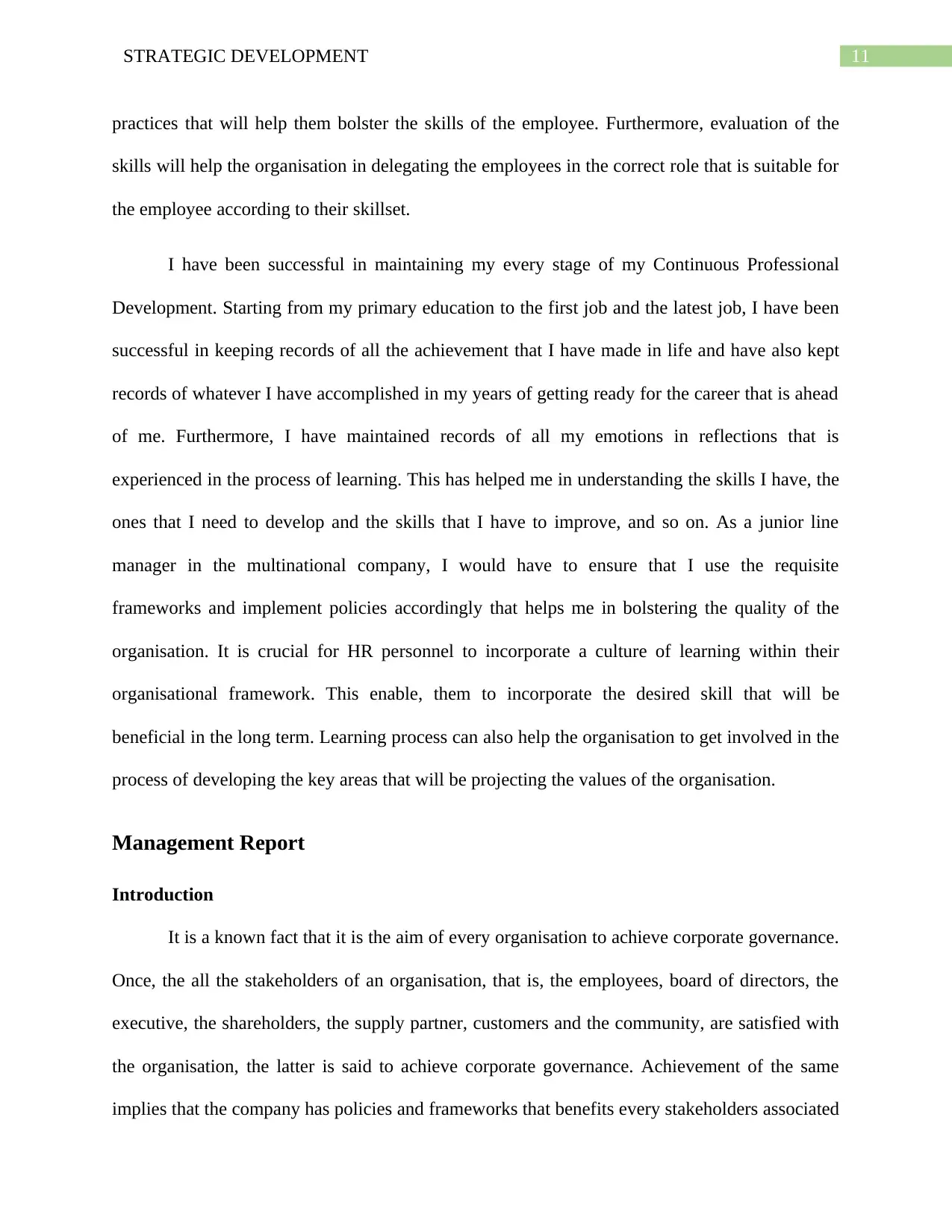
11STRATEGIC DEVELOPMENT
practices that will help them bolster the skills of the employee. Furthermore, evaluation of the
skills will help the organisation in delegating the employees in the correct role that is suitable for
the employee according to their skillset.
I have been successful in maintaining my every stage of my Continuous Professional
Development. Starting from my primary education to the first job and the latest job, I have been
successful in keeping records of all the achievement that I have made in life and have also kept
records of whatever I have accomplished in my years of getting ready for the career that is ahead
of me. Furthermore, I have maintained records of all my emotions in reflections that is
experienced in the process of learning. This has helped me in understanding the skills I have, the
ones that I need to develop and the skills that I have to improve, and so on. As a junior line
manager in the multinational company, I would have to ensure that I use the requisite
frameworks and implement policies accordingly that helps me in bolstering the quality of the
organisation. It is crucial for HR personnel to incorporate a culture of learning within their
organisational framework. This enable, them to incorporate the desired skill that will be
beneficial in the long term. Learning process can also help the organisation to get involved in the
process of developing the key areas that will be projecting the values of the organisation.
Management Report
Introduction
It is a known fact that it is the aim of every organisation to achieve corporate governance.
Once, the all the stakeholders of an organisation, that is, the employees, board of directors, the
executive, the shareholders, the supply partner, customers and the community, are satisfied with
the organisation, the latter is said to achieve corporate governance. Achievement of the same
implies that the company has policies and frameworks that benefits every stakeholders associated
practices that will help them bolster the skills of the employee. Furthermore, evaluation of the
skills will help the organisation in delegating the employees in the correct role that is suitable for
the employee according to their skillset.
I have been successful in maintaining my every stage of my Continuous Professional
Development. Starting from my primary education to the first job and the latest job, I have been
successful in keeping records of all the achievement that I have made in life and have also kept
records of whatever I have accomplished in my years of getting ready for the career that is ahead
of me. Furthermore, I have maintained records of all my emotions in reflections that is
experienced in the process of learning. This has helped me in understanding the skills I have, the
ones that I need to develop and the skills that I have to improve, and so on. As a junior line
manager in the multinational company, I would have to ensure that I use the requisite
frameworks and implement policies accordingly that helps me in bolstering the quality of the
organisation. It is crucial for HR personnel to incorporate a culture of learning within their
organisational framework. This enable, them to incorporate the desired skill that will be
beneficial in the long term. Learning process can also help the organisation to get involved in the
process of developing the key areas that will be projecting the values of the organisation.
Management Report
Introduction
It is a known fact that it is the aim of every organisation to achieve corporate governance.
Once, the all the stakeholders of an organisation, that is, the employees, board of directors, the
executive, the shareholders, the supply partner, customers and the community, are satisfied with
the organisation, the latter is said to achieve corporate governance. Achievement of the same
implies that the company has policies and frameworks that benefits every stakeholders associated
⊘ This is a preview!⊘
Do you want full access?
Subscribe today to unlock all pages.

Trusted by 1+ million students worldwide
1 out of 23
Related Documents
Your All-in-One AI-Powered Toolkit for Academic Success.
+13062052269
info@desklib.com
Available 24*7 on WhatsApp / Email
![[object Object]](/_next/static/media/star-bottom.7253800d.svg)
Unlock your academic potential
Copyright © 2020–2026 A2Z Services. All Rights Reserved. Developed and managed by ZUCOL.





